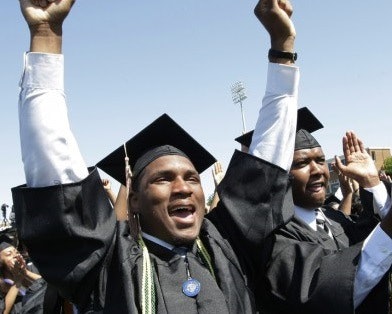
In “Closing the Race Gap: Alleviating Young African American Unemployment Through Education,” a research report that examines the link between race and education, researchers with the Washington-based Young Invincibles advocacy organization have found that, while young Black adults at all education levels experience higher unemployment rates than others, such employment gaps diminish considerably as Black educational attainment increases.
In a striking example cited in the report, young African-American adults need to have earned an associate’s degree to have the same job prospects as young White adults who have only earned a high school diploma. In addition, an African-American male needs some college credit to have a similar probability of employment as a White male high school dropout, the report says.
“We found that young African-Americans have a lower probability [than others] of having a job at every level of education. In fact, young African-Americans need two more levels of education to have the same chance at landing a job as their White peers,” said Young Invincibles research and policy manager Tom Allison this past Thursday during a news media conference call that included U.S. Senator Mary Landrieu, D-La.
Landrieu participated in the news media call to talk about the Creating Higher Education Affordability Necessary to Compete Economically (CHANCE) Act that she has introduced in the U.S. Senate. The legislation is expected to help close the employment gap between White and African-American young adults by making college more affordable and accessible. If enacted, the CHANCE Act would restore the original purchasing power of the Pell Grant annual award by increasing it to $8,900 from $5,730.
Citing the comparison of African-Americans holding associate’s degrees and White high school graduates, Allison told reporters the additional schooling of earning an “associate’s degree can cost upward of $20,000 and take a commitment of two years” helps illustrate the formidable challenge confronting African-Americans in the U.S. economy.
“So, you think about that investment [for an African-American] just to have the same chance of having a job as a White high school graduate. … This is really statistical evidence that African-Americans really do need to work twice as hard to compete in this country,” he said.
The report lays out policy recommendations largely aimed at Congress as it seeks to reauthorize the Higher Education Act. The report’s recommended policy solutions, including Landrieu’s proposed CHANCE Act, focus largely “on ways to foster higher educational attainment among all young people, but particularly among students of color.”
Allison and his co-authors contend in the report that “increasing educational attainment is key to closing the employment gap” between African-Americans and others. “While young African-American unemployment is higher than Whites at every educational level, the added value of each additional degree of educational attainment, in terms of employment opportunity as well as income, is much greater for young African-Americans than young Whites,” the report states.
For example, the effect of a high school diploma on job chances for African-American men is 50 percent larger than the same degree for a White male, but a professional degree provides a Black male a 146 percent greater effect than the same degree for a White male. Similar trends occur for Black and White women.
With more education, the employment gap significantly diminishes as African-Americans earn college and graduate degrees. “An African-American male with a bachelor’s degree is only five percentage points less likely to have a job than a White male bachelor’s degree holder. An African-American female with a bachelor’s is only three percentage points less likely to be employed than a similarly educated White woman. … Among professional degree holders, the racial gap between races is virtually erased,” according to the report.
“This data is compelling,” Landrieu said in describing the Closing the Race Gap report and the challenge it presents. “I’m very proud to have introduced the CHANCE Act, which seeks to address one aspect of this great challenge and that is to increase the value of the Pell Grant.”
Dr. Terri Friedline, an assistant professor of social welfare at the University of Kansas, said she believes the Closing the Race Gap report is providing timely and fresh analysis on the dilemma of African-American unemployment. The report’s push for increased educational attainment by African-Americans “makes a good point that, while there are still disparities in [employment] access … education does pay out,” said Friedline, who conducts research aimed at improving young people’s economic and educational well-being.





















